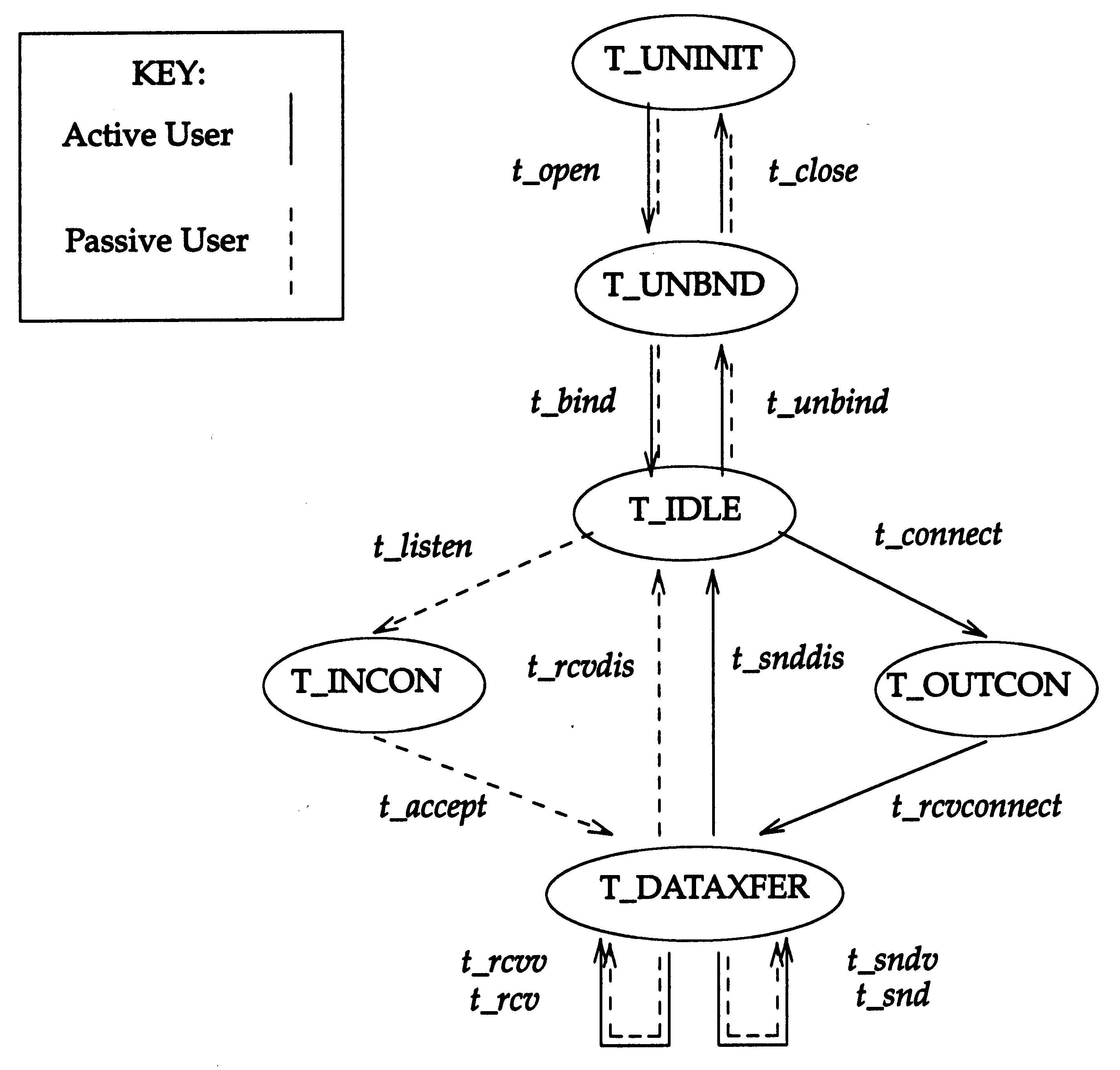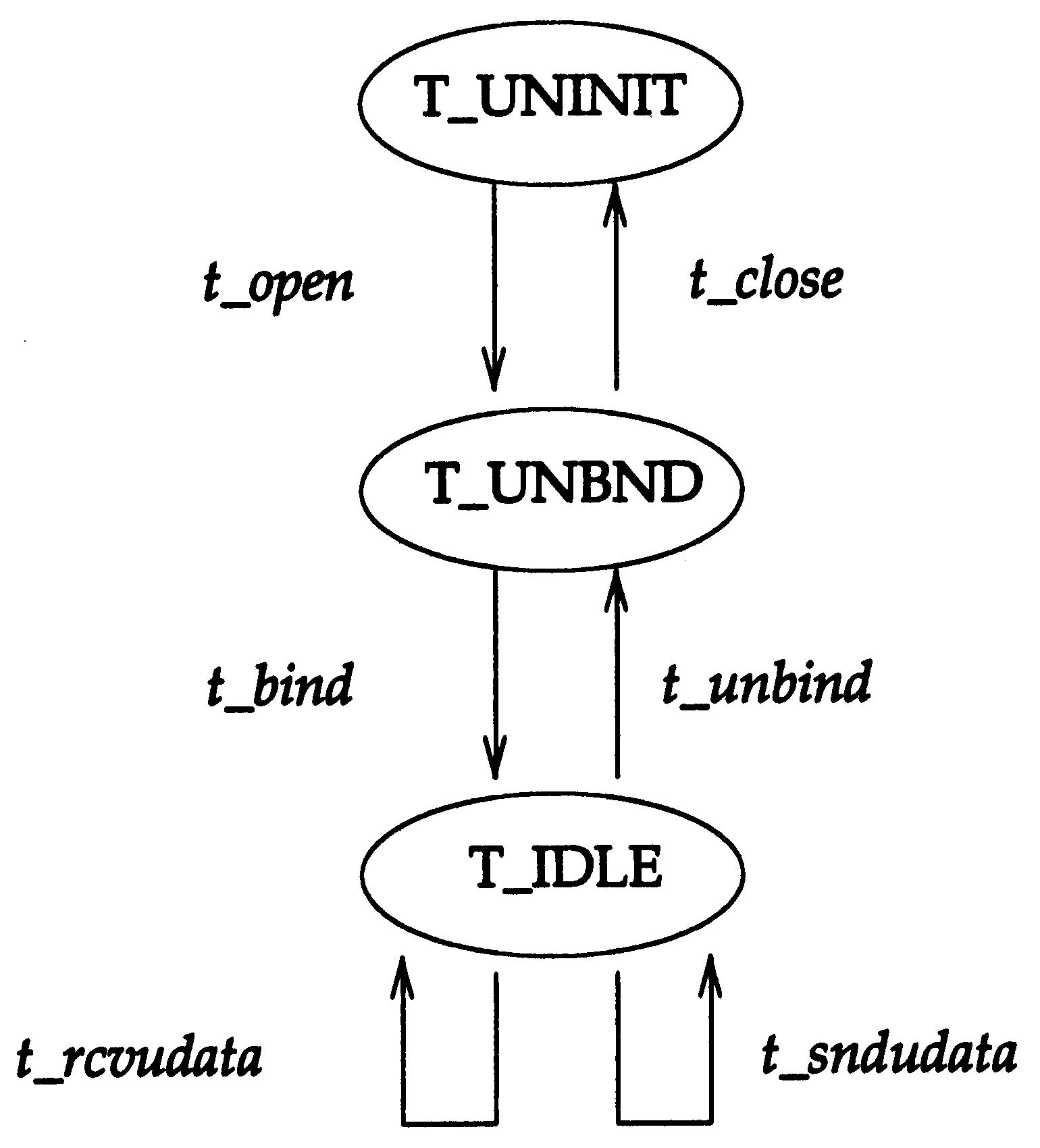
The following rules apply only to the connection-mode transport
The state diagram in
| Active User | Passive User | |
|---|---|---|
| t_open() | t_open() | |
| t_bind() | t_bind() | |
| t_listen() | ||
| t_connect() | ||
| t_accept() | ||
| t_rcvconnect() | ||
| t_snd() | ||
| t_sndv() | ||
| t_rcv() | ||
| t_rcvv() | ||
| t_snddis() | ||
| t_rcvdis() | ||
| t_unbind() | t_unbind() | |
| t_close() | t_close() |

The state diagram that follows shows the flow of the events through
the various states.
This example shows a successful exchange of data between user A and
user B.
For a detailed description of all possible states and events,
see
| User A | User B | |
|---|---|---|
| t_open() | t_open() | |
| t_bind() | t_bind() | |
| t_sndudata() | ||
| t_rcvudata() | ||
| t_unbind() | t_unbind() | |
| t_close() | t_close() |

These guidelines provide information additional to that given in
For applications to use XTI in a fully asynchronous manner, they will need
to use the facilities of an Event Management (EM) Interface.
Such an EM will
In the same way, the EM mechanism should allow the application to be notified of events coming from external sources, such as:
When handling multiple transport connections, the application could either:
or:
The application will have to maintain an appropriate balance and choose the right trade-off between the number of processes and the number of connections managed per process in order to minimise the resulting overhead.
Unfortunately, the system facilities to suspend and await notification of an event are presently system-dependent, although work is in progress within standards bodies to provide a unified and portable mechanism.
Hence, for the foreseeable future, applications could use whatever underlying system facilities exist for event notification.
Many vendors currently provide either the System V
Given the fact that a transport endpoint identifying a transport connection
maps to a file descriptor, applications can take advantage of such
EM mechanisms offered by the system (for example,
Guidelines for the use of
The XTI events can be divided into two classes of events.
| T_LISTEN | Connect request indication. |
| T_CONNECT | Connect response indication. |
| T_DATA | Reception of normal data indication. |
| T_EXDATA | Reception of expedited data indication. |
| T_DISCONNECT | Disconnection request indication. |
| T_ORDREL | Orderly release request indication. |
| T_UDERR | Notification of an error in a previously sent datagram. |
This class of events should always be monitored by the application.
| T_GODATA | Normal data may be sent again. |
| T_GOEXDATA | Expedited data may be sent again. |
This class of events informs the application that flow control restrictions have been lifted on a given file descriptor.
The application should request to be notified of this class of events
whenever a flow control restriction has previously occurred on this endpoint
(for example, [TFLOW] error has been returned on a
Note that this class of event should not be monitored systematically otherwise the application would be notified each time a message is sent.
#define ERREVENTS
(POLLERR | POLLHUP | POLLNVAL)
#define INEVENTS
(POLLIN | POLLRDNORM | POLLRDBAND | POLLPRI)
#define OUTEVENTS
(POLLOUT | POLLWRBAND)
#define MY_PROVIDER
1
/*
transport provider id
*/
#define MAXSIZE
4000
/*
size of send/receive buffer
*/
#define TPLEN
30
/*
maximum length of provider name
*/
#define MAXCNX
10
/*
maximum number of connections
*/
extern int errno;
/*
* Declaration of non-integer external functions
*/
void exit();
void perror();
/* ============================================================== */
register int
i;
/*
loop variable
*/
register int
num;
/*
return value of t_snd()
*/
/*
and t_rcv()
*/
int
discflag = 0;
/*
flag to indicate a
*/
/*
disc indication
*/
int
errflag = 0;
/*
flag to indicate an error
*/
int
event;
/*
stores events returned
*/
/*
by t_look()
*/
int
fd;
/*
current file descriptor
*/
int
fdd;
/*
file descriptor
*/
/*
for t_accept()
*/
int
flags;
/*
used with t_rcv()
*/
char
*datbuf;
/*
current send/receive buffer
*/
unsigned int
act = 0;
/*
active endpoints
*/
struct t_info
info;
/*
used with t_open()
*/
struct t_bind
*preq;
/*
used with t_bind()
*/
struct t_call
*pcall;
/*
used with t_listen()
*/
/*
and t_accept()
*/
struct t_discon
discon;
/*
used with t_rcvdis()
*/
char
tpname[TPLEN];
/*
transport provider name
*/
char
buf[MAXCNX][MAXSIZE];
/*
send/receive buffers
*/
int
rcvdata[MAXCNX];
/*
amount of data
*/
/*
already received
*/
int
snddata[MAXCNX];
/*
amount of data already sent
*/
struct pollfd
fds[MAXCNX];
/*
used with poll()
*/
/*
* Get name of transport provider
*/
if (get_provider(MY_PROVIDER, tpname) == -1) {
perror(">>> get_provider failed");
exit(1);
}
/*
* Establish a transport endpoint in asynchronous mode
*/
if ((fd = t_open(tpname, O_RDWR | O_NONBLOCK, &info)) == -1) {
t_error(">>> t_open failed");
exit(1);
}
#define MY_PROVIDER
1
/*
transport provider id
*/
#define MAXSIZE
4000
/*
size of send/receive buffer
*/
#define TPLEN
30
/*
maximum length of provider name
*/
#define MAXCNX
10
/*
maximum number of connections
*/
extern int errno;
register int
i;
/*
loop variable
*/
register int
num;
/*
return value of t_snd()
*/
/*
and t_rcv()
*/
int
discflag = 0;
/*
flag to indicate a
*/
/*
disc indication
*/
int
errflag = 0;
/*
flag to indicate an error
*/
int
event;
/*
stores events returned
*/
/*
by t_look()
*/
int
fd;
/*
current file descriptor
*/
int
fdd;
/*
file descriptor
*/
/*
for t_accept()
*/
int
flags;
/*
used with t_rcv()
*/
char
*datbuf;
/*
current send/receive
*/
/*
buffer
*/
size_t
act = 0;
/*
active endpoints
*/
struct t_info
info;
/*
used with t_open()
*/
struct t_bind
*preq;
/*
used with t_bind()
*/
struct t_call
*pcall;
/*
used with t_listen()
*/
/*
and t_accept()
*/
struct t_discon
discon;
/*
used with t_rcvdis()
*/
char
tpname[TPLEN];
/*
transport provider name
*/
int
fds[MAXCNX];
/*
array of file descriptors
*/
char
buf[MAXCNX][MAXSIZE]
/*
send/receive buffers
*/
int
rcvdata[MAXCNX];
/*
amount of data
*/
/*
already received
*/
int
snddata[MAXCNX];
/*
amount of data already sent
*/
fd_set rfds, wfds, xfds;
/*
file descriptor sets
*/
/*
for select()
*/
fd_set rfdds, wfdds, xfdds;
/*
initial values of
*/
/*
file descriptor sets
*/
/*
rfds, wfds and xfds
*/
| Contents | Next section | Index |